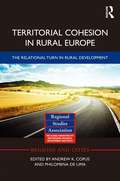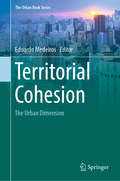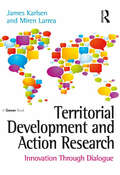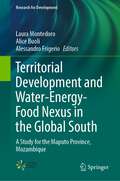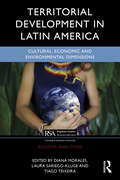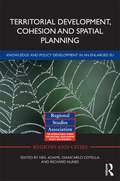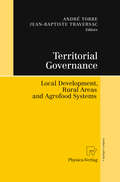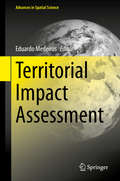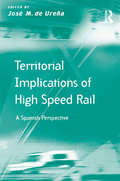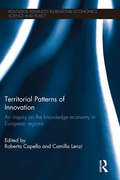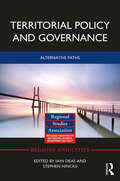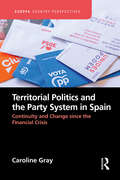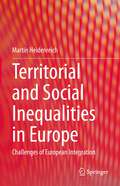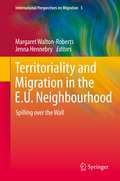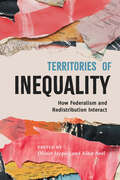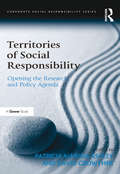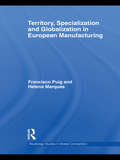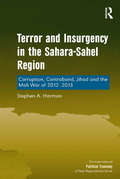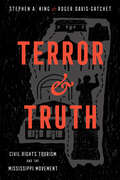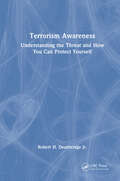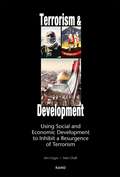- Table View
- List View
Terrapin Laboratory
by Joseph Fuller Richard G. HamermeshDescribes the formation and rapid growth of a drug testing company. The company needs to decide whether to enter the painkiller testing market, in addition to growing its drug treatment center business. The associated teaching materials provide students the opportunity to weigh the attractiveness of alternative mechanisms for financing the company's expansion.
Terreur Sur Wall Street
by Kenneth EadeL’effondrement du marché boursier a crée un effet d’entraînement dans des proportions désastreuses. Les banques ont échoué, et les gens provoquent des émeutes dans les rues de villes, qui sont en feu. Des pannes localisées ont fait naitre les échecs du système dans son entier. Le professeur d’économie de l’Université de Chicago Harry Mason, Conseiller des président Américains et du Département du Trésor, a rassemblé son équipe de rêve de "jeunes prodiges," les étudiants les plus brillants et diplômés en Economie, pour une classe laboratoire spéciale. Leur mission sauver le monde. Mais est-ce trop tard?
Territorial Cohesion in Rural Europe: The Relational Turn in Rural Development (Regions and Cities)
by Andrew K. Copus Philomena De LimaThis book reflects on how the economies, social characteristics, ways of life and global relationships of rural areas of Europe have changed in recent years. This reveals a need to refresh the concepts we use to understand, measure and describe rural communities and their development potential. This book argues that Europe has 'outgrown' many of the stereotypes usually associated with it, with substantial implications for European Rural Policy. Rural structural change and its evolving geography are portrayed through regional typologies and the concept of the New Rural Economy. Demographic change, migration, business networks and agricultural restructuring are each explored in greater detail. Implications for equality and social exclusion, and recent developments in the field of governance are also considered. Despite being a subject of active debate, interventions in the fields of rural and regional development have failed to adapt to changing realities and have become increasingly polarized. This book argues that rural/regional policy needs to evolve in order to address the current complex reality, partially reformulating territorial or place-based approaches, and the New Rural Paradigm, following a set of principles termed ‘Rural Cohesion Policy’.
Territorial Cohesion: Cohesion, Development, Impact Assessment And Cooperation (Routledge Advances In European Politics Ser.)
by Eduardo MedeirosThis book offers a comprehensive overview of several urban related aspects that are of central importance to successful territorial cohesion processes. In essence, it sheds new light on issues concerning urban polycentrism, functional urban regions, integrated sustainable urban development, and the EU Urban Agenda; and on how they can help to achieve territorial cohesion policy goals. As an elusive and fairly recent concept, territorial cohesion has to date only been vaguely debated in the available literature, which for the most part focuses on its historical origins and its relevance for EU policymaking. Instead, this book synthesizes, for the first time, a range of perspectives that place urban elements and policies at the core of territorial cohesion analysis. As such, and given the fact that territorial cohesion is a holistic concept, the book will appeal to a broad readership from both the academic and policymaking arenas.
Territorial Development and Action Research: Innovation Through Dialogue
by James Karlsen Miren LarreaTerritorial Development and Action Research examines the role of action research within fields such as territorial development and innovation. Most researchers analyse these fields from the outside, developing a theoretical understanding of what should be done, but not of how to do it. Based on their own experience of territorial development processes from the inside out, James Karlsen and Miren Larrea argue that filling the gap regarding social relations in the innovation process makes it possible for researchers to engage in the processes taking place in the territory, thereby revealing how to make things work. This book will help researchers face the pressure to engage and play a useful role in the development of their host regions. It will help policy makers to continuously learn and redefine policy approaches and bring about collaboration through networks, programs and projects where researchers and practitioners in regional, local and urban development work together to construct territorial development. Readers will acquire a better understanding of micro-territorial development processes and the roles played by individuals and coalitions in endogenous development processes.
Territorial Development and Water-Energy-Food Nexus in the Global South: A Study for the Maputo Province, Mozambique (Research for Development)
by Alessandro Frigerio Laura Montedoro Alice BuoliThis volume collects the results from the Politecnico di Milan’s award-winning “Boa_Ma_Nhã, Maputo!” research-by-design project, which studied various transdisciplinary approaches to development in the context of the Global South. The challenges of urbanization are well known, but that only goes so far in aiding implementation. From local considerations like water access and housing rights to global issues like climate change, territorial development demands solutions that address the needs of the specific population while keeping such goals as sustainability and inclusion in mind. By focusing on a number of towns within the Maputo Province of Mozambique, and thus addressing many of the issues endemic to Sub-Saharan Africa, the research, structurally presented so as to aid those who may require introduction to the issue, makes a clear case in favor of always keeping the Water-Energy-Food (WEF) Nexus in mind when formulating development strategies for improving people’s lives, as well as the wisdom of marrying academic findings with the insights accrued by local NGOs and institutions, thereby expanding the potential idea bank beyond the Eurocentric status quo that has tended to dominate the field.
Territorial Development in Latin America: Cultural, Economic and Environmental Dimensions (Regions and Cities)
by Diana Morales Laura Sariego-Kluge Tiago TeixeiraThis book explores one of the most pressing issues of our time: development, a concern that has persisted from the past century through to today, and is increasingly intertwined with challenges related to environmental sustainability and growing inequalities. Despite numerous academic and policy interventions, development remains an elusive goal. Hence, this book explains how conceptualisations alternative to economic growth, have evolved in Latin American geographical literature and shows their practical applications in various contexts.The book argues for a broader, more inclusive approach to development - territorial development - that integrates ecological, cultural, economic and social concerns. By focusing on territorial development seen from a theoretical perspective but also applied through case studies, the book underscores the importance of understanding the historical and power dynamics that influence how territories are shaped, for whom, and by whom. The book is divided into two parts. The first part provides a theoretical and historical background on development and territory in Latin America, presenting critical methodological perspectives for aligning academic research with community and environmental wellbeing. The second part consists of case studies that illustrate how different understandings of territory influence development agendas in diverse settings across the region.Scholars, researchers and post-graduate students will find this an invaluable resource, as will policymakers and organizations interested in developmental practices.
Territorial Development, Cohesion and Spatial Planning: Building on EU Enlargement (Regions And Cities Ser. #46)
by Neil Adams Giancarlo Cotella Richard NunesThis book examines some of the evolving challenges faced by EU regional policy in light of enlargement and to assess some of the approaches and trends in terms of territorial development policy and practice that are emerging out of this process. Focusing on the experiences on Central and Eastern Europe, these chapters reflect on the diversity of approaches to spatial planning and the the politics of policy formation and multi-level governance operations – from local to trans-national agendas. Promoting increased awareness and understanding of these issues is the main purpose of the book, as well as harnessing the extensive capacity and ‘knowledge’ within these countries that can greatly enrich the discourse within an enlarged ‘epistemic community’ of European spatial planning academics, practitioners and policy-makers. The recently acquired CEE dimension provides a unique opportunity to examine the evolution of existing ‘epistemic communities’ as well as to explore the potential emergence of new ones..
Territorial Governance
by André Torre Jean-Baptiste TraversacThis work aims to present the most recent developments regarding territorial governance, placing particular emphasis on rural and periurban areas. The reader will find information on the processes of development of European regions, as well as on the behaviours and strategies adopted by the different actors who live in these territories and contribute to the latter's livelihood. The first part of the book analyses the structural changes in the modes of production that have affected these territories. The second part addresses the questions of methodology and of the structures of governance of local development in rural areas. The last section makes an assessment of the geographical indications as tools of governance of local agrifood chains. The book was written by economists, geographers, land use planners and specialists of the questions of governance and management of rural and periurban areas.
Territorial Impact Assessment: Cohesion, Development, Impact Assessment And Cooperation (Advances in Spatial Science)
by Eduardo MedeirosThis book presents a comprehensive debate and analysis of existing Territorial Impact Assessment (TIA) methodologies, designed under the auspices of the ESPON programme since the mid-2000s. This is intended to serve as a TIA handbook for the reader, to better understand the main differences, advantages and shortcomings of each presented TIA methodology. It also serves as a manual for professors and students in the field of policy evaluation, and territorial analysis, as it presents concrete examples of the implementation of each TIA methodology, their formulas and intrinsic evaluation elements. The purpose of policy evaluation methodologies is to check the main effects of private and public investments, in order to report back to policymakers and citizens on their efficiency and effectiveness. Over the past decades, both in Europe and worldwide, there has been an increasingly awareness of the need to implement/reinforce policy evaluation practices, at all territorial levels. At the same time, it has become widely accepted that many policy interventions produce impacts in more than one dimensions of territorial development. In this context, the use of a holistic and territorial approach for policy impact assessment evaluation has rapidly been adopted by the European Commission as a mainstream policy evaluation procedure.
Territorial Implications of High Speed Rail: A Spanish Perspective (Transport and Mobility)
by José M. De UreñaHigh Speed Rail's (HSR) main objective is to attract air passengers between big metropolitan areas however the main territorial implications in many cases occur not in these metropolitan areas but in the intermediate cities. These implications open up new spatial planning possibilities such as decentralization, new regional centres and urban renewal projects. This book presents the experience of 20 years of HSR in Spain including some explicit information, arguments and conclusions derived from HSR in other European Countries. It debates the HSR territorial implications at three scales: national, regional and local, thus being of interest for strategic debates at those scales, such as the decision of new national lines, the pros and cons of deviating the line to reach minor intermediate cities or the selection of precise locations for new stations and the development projects in their surroundings. Comparisons with the recent changes in accessibility, spatial distribution of population and activities, are made with mobility for working purposes and with the characteristics of the HSR passengers. This book also examines the actions, strategies and urban projects that medium size cities can use to make best use of HSR opportunities, synthesising the experience of HSR medium cities in Spain and Europe. The book's conclusions will be of interest, over and above scholars, to transport infrastructure decision makers, city and regional planners and managers, and transport companies.
Territorial Patterns of Innovation: An Inquiry on the Knowledge Economy in European Regions (Routledge Advances in Regional Economics, Science and Policy #1)
by Roberta Capello Camilla LenziThis edited volume describes the spatial diffusion of knowledge and innovation using a large dataset at the regional level, and presents scientific evidence on the role of knowledge and innovation on regional development. The empirical results support a new design for innovation policies at the regional level, which could help the European Union to achieve the targets set up in its 2020 Agenda. Today, financial capital, general information, consolidated technologies and codified knowledge are readily available virtually everywhere. However, the ability to organize these ‘pervasive’ factors into continuously innovative production processes and products is by no means pervasive and generalized; rather, it exists selectively only in some places where tacit knowledge is continuously created, exchanged and utilized and business ideas find their way to real markets. Territorial Patterns of Innovation provides evidence that, contrary to popular belief, local knowledge intensity does not necessarily guarantee higher innovation performance. Moreover, the book shows that the growth benefits deriving from innovation do not necessarily match the strength of the formal local knowledge base, and that regions innovating in the absence of a strong local knowledge base can be as successful as more knowledge-intensive regions in turning innovation into a higher growth rate. Together, the contributions in this book offer a new understanding of the relationship between knowledge, innovation and regional performance by delving beyond generally held beliefs. It will be of value to regional scientists, industrial economists and policymakers.
Territorial Policy and Governance: Alternative Paths (Regions and Cities)
by Iain Deas Stephen HincksIn response to both policy and conceptual debates, alternative narratives have begun to emerge about territorial governance and policymaking. As local and regional policy actors strive to respond to the geographically uneven effects of the economic crises of the early twenty-first century, a crucial question emerges: what are the opportunities and challenges presented by alternative forms of territorially based governance and policy? The aim of this edited volume, therefore, is critically to explore the opportunities and challenges presented by different forms of territorial policy and governance. Drawing on conceptual debates and empirical research from the United Kingdom and other international contexts, the contributors engage with issues around the politics and governance of territorial development, economic development, planning and regeneration and the environment. Territorial Policy and Governance addresses the question of how alternative forms of territorial governance and policy can help to shape patterns of urban and regional development, highlighting the related opportunities, constraints and challenges that confront their operationalisation. This book will be essential reading for international audiences with an interest in territorial development, governance, politics, human geography and planning and regeneration.
Territorial Politics and the Party System in Spain: Continuity and change since the financial crisis (Europa Country Perspectives)
by Caroline GrayAcross Western Europe, the global financial crisis of 2008 and its aftermath not only brought economic havoc but also, in turn, intense political upheaval. Many of the political manifestations of the crisis seen in other Western and especially Southern European countries also hit Spain, where challenger parties caused unprecedented parliamentary fragmentation, resulting in four general elections in under four years from 2015 onwards. Yet Spain, a decentralised state where extensive powers are devolved to 17 regions known as ‘autonomous communities’, also stood out from its neighbours due to the importance of the territorial dimension of politics in shaping the political expression of the crisis. This book explains how and why the territorial dimension of politics contributed to shaping party system continuity and change in Spain in the aftermath of the financial crisis, with a particular focus on party behaviour. The territorial dimension encompasses the demands for ever greater autonomy or even sovereignty coming from certain parties within the historic regions of the Basque Country, Catalonia and, to a lesser extent, Galicia. It also encompasses where these historic regions sit within the broader dynamics of intergovernmental relations across Spain’s 17 autonomous communities in total, and how these dynamics contribute to shaping party strategies and behaviour in Spain. Such features became particularly salient in the aftermath of the financial crisis since this coincided with, and indeed accelerated, the rise of the independence movement in Catalonia.
Territorial and Social Inequalities in Europe: Challenges of European Integration
by Martin HeidenreichThis book examines social inequalities in Europe, especially those caused by economic factors. It starts with the paradox of European inequality, where on the one hand, even total income inequality in Europe is significantly lower than in most parts of the world; but on the other, Europe is also characterised by profound and durable inequalities within the continent. It discusses inequalities caused by the exclusion of marginalised groups from the labour market, with considerable and sometimes increasing differences between central and peripheral regions, pronounced wealth and labour market inequalities, and significant rates of persistent poverty, deprivation, educational poverty, low wages and unemployment. The book also discusses broader territorial inequalities, which are the basis for divisions between Northern and Southern Europe, East and West, between qualified and unqualified employees, younger and older people, men and women, and migrants and non-migrants. The book raises questions about the winners and losers of the social transformations linked to the introduction of the Euro, the Eastern enlargement of the EU, and the financial and Eurozone crises. It is based on a comprehensive analysis of a European-wide microdata set on income and living conditions (EU-SILC). The empirical research material, which is the first to deploy this data in a comprehensive manner, consists of detailed empirical analyses of social divisions and Europeanisation processes in 30 European countries. It analyses and explains the transformation of the previously dominant national spaces into a European social space. This topical book is of interest to academics and students in the fields of sociology and comparative social sciences, along with those studying European regional geography, anthropology, international relations, and international politics.
Territoriality and Migration in the E.U. Neighbourhood: Spilling over the Wall
by Margaret Walton-Roberts Jenna HennebryThis volume brings together an interdisciplinary group of scholars around an important question: how has migration changed in Europe as the European Union has enlarged, and what are the consequences for countries (and for migrants themselves) inside and outside of these redrawn jurisdictional and territorial borders? By addressing this question the book contributes to three current debates with respect to EU migration management: 1) that recent developments in EU migration management represent a profound spatial and organizational reconfiguration of the regional governance of migration, 2) the trend towards the externalization or subcontracting of migration control and, 3) how the implications of Europe's changing immigration policy are increasingly felt across the European neighborhood and beyond. Based on new empirical research, the authors in this collection explore these three processes and their consequences for both member and non-member EU states, for migrants themselves, and for migration systems in the region. The collection indicates that despite the rhetoric of social and spatial integration across the EU region, as one wall has come down, new walls have gone up as novel migration and security policy frameworks have been erected - making European immigration more complex, and potentially more influential beyond the EU zone, than ever.
Territories of Inequality: How Federalism and Redistribution Interact (Democracy, Diversity, and Citizen Engagement Series)
by Alain Noël Olivier JacquesThe rise of income and wealth inequality and the possibilities of redistribution animate contemporary social and political debates, but much of the scholarship on the issue is limited to the individual level. There is a spatial dimension to the redistribution of income, however, and in federations, this is especially important.In Territories of Inequality leading political scientists propose a territorial approach to inequality and redistribution, informed by political economy, political geography, and a comparative analysis of federalism and multilevel governance. Chapters explore the relationship between interpersonal and interregional redistribution, the role of progressive or regressive governing coalitions, and the foundations of individual preferences for or aversions to interregional redistribution. They consider different federations and quasi-federations and emphasize the unique situation of Indigenous Peoples, who navigate a complex relationship with institutions shaped by colonialism.Examining how decentralization and federalism influence policy outcomes and public preferences, Territories of Inequality provides new ways to approach the question of redistribution.
Territories of Social Responsibility: Opening the Research and Policy Agenda (Corporate Social Responsibility)
by Patricia Almeida AshleyCSR is a fragile concept if conceived only at the organizational level or driven only by leadership will. Many writers deal with aspects of social responsibility, but most deal with it as this kind of organizational and voluntary initiative. Few address the wider policy agenda. The contributors to Territories of Social Responsibility - researchers and practitioners from four continents - all participated in an international workshop co-ordinated by Patricia Almeida Ashley as part of her role as Chair in Development and Equity at the International Institute of Social Studies. They form a policy network contributing to studies on the concept of a multi-actor, multilevel and territorial approach to social responsibility and governance, oriented towards global, regional or local development and equity goals. This book introduces a new conceptual framework and promotes a research and policy agenda relating to it. A new model sees CSR embedded in institutional and legal frameworks, communicated and understood through a vector of communication and knowledge influencing situated culture and social values, and classified into three levels of ethical challenges. All of this can be expressed into the social processes of education, governance, the development of civil society, and policy making - a renovation of the existing perspectives on the concept of social responsibility. This ground breaking book integrates conceptual and empirical contributions and opens a research and policy agenda for the future. It will appeal to academics, higher level students, policy makers, and to leaders of and advisors to organizations affected by social responsibility issues.
Territory, specialization and globalization in European Manufacturing (Routledge Studies In Global Competition Ser. #51)
by Francisco Puig Helena MarquesAlthough traditional manufacturing (textiles, clothing, footwear, furniture, etc) has been in decline in developed countries, it still represents an important part of European employment due to its labour-intensive character. Moreover, its geographical concentration particularly exposes certain regions of Europe to job loss as the industry declines. This book provides an explanation for the differences observed in the impact of globalization which is based on the influence of the territory and of the production specialization of the firms. The conclusions presented in the book are withdrawn from a detailed study of the Spanish textile-clothing sector. The book highlights the intensity of the relationship between the organizational model of the territory where the firms are located (high concentration of interrelated firms in a well-defined geographical area called "industrial district"), the specialization strategy implemented and the globalization of the economy. It also suggests the need to consider those factors as interdependent determinants of firm performance, particularly given the current trend for firms to simultaneously concentrate geographically and multilocalize domestically and internationally. The proposed methodology of analysis can be used to study other manufacturing sectors in other European countries.
Terror and Insurgency in the Sahara-Sahel Region: Corruption, Contraband, Jihad and the Mali War of 2012-2013 (The International Political Economy of New Regionalisms Series)
by Stephen A. HarmonHarmon focuses on terrorism and insurgency in the lawless expanse of the Sahara Desert and the adjacent, transitional Sahel zone, plus the broader meta-region that includes countries such as Algeria, Mali, and Nigeria, and to a lesser extent, Niger and Mauritania. Covering such issues as Islamist terrorism, border insecurity, contraband, and human trafficking, this book looks at the interrelated problems of political and social pathologies that affect terrorist movements and security in the region. A valuable publication, it treats a series of related problems on the basis of a broadly defined area, with a special emphasis on the role of Islam as both a moderating and exacerbating factor. The book has a broader appeal than more narrowly focused country studies that derive from the perspective of only one problem such as terrorism or border insecurity.
Terror and Truth: Civil Rights Tourism and the Mississippi Movement (Race, Rhetoric, and Media Series)
by Stephen A. King Roger Davis GatchetStephen A. King and Roger Davis Gatchet examine how Mississippi confronts its history of racial violence and injustice through civil rights tourism. Mississippi’s civil rights memorials include a vast constellation of sites and experiences—from the humble Fannie Lou Hamer Museum in Ruleville to the expansive Mississippi Civil Rights Museum in Jackson—where the state’s collective memories of the movement are enshrined, constructed, and contested. Rather than chronicle the history of the Mississippi Movement, the authors explore the museums, monuments, memorials, interpretive centers, homes, and historical markers marketed to heritage tourists in the state. Terror and Truth: Civil Rights Tourism and the Mississippi Movement is the first book to examine critically and unflinchingly Mississippi’s civil rights tourism industry. Combining rhetorical analysis, onsite fieldwork, and interviews with museum directors, local civil rights entrepreneurs, historians, and movement veterans, the authors address important questions of memory and the Mississippi Movement. How is Mississippi, a poor, racially divided state with a long history of systemic racial oppression and white supremacy, actively packaging its civil rights history for tourists? Whose stories are told? And what perspectives are marginalized in telling those stories? The ascendency of civil rights memorialization in Mississippi comes at a time when the nation is reckoning with its racial past, as evidenced by the Black Lives Matter movement, Mississippi’s adoption of a new state flag, the conviction of former members of the Ku Klux Klan, and the removal of Confederate monuments throughout the South. Terror and Truth directly engages this national conversation.
Terror in Global Narrative
by George Fragopoulos Liliana M. NaydanThis is a collection of interdisciplinary essays that examines the historical, political, and social significance of 9/11. This collection considers 9/11 as an event situated within the much larger historical context of late late-capitalism, a paradoxical time in which American and capitalist hegemony exist as pervasive and yet under precarious circumstances. Contributors to this collection examine the ways in which 9/11 changed both everything and, at the same time, nothing at all. They likewise examine the implications of 9/11 through a variety of different media and art forms including literature, film, television, and street art.
Terrore a Wall Street
by Kenneth Eade Federico Greco100% di possibilità di fallimento, ma la speranza di una previsione. Uno “shock and awe” feroce che mescola fiction e non-fiction dallo scrittore di best seller che la critica ha salutato come ‘uno dei più robusti autori di thriller sulla scena’. Siamo nel 2020 e il mondo è sull’orlo del collasso economico. Riusciranno a salvarci un gruppo di studenti prodigio guidati da un professore di economia con la testa fra le nuvole e una ragazza di 24 anni? Il crollo del marcato azionario ha generato un effetto domino di proporzioni disastrose. Le banche sono fallite e la gente si ribella per le strade delle città ormai in fiamme. Blackout enormi hanno ceduto il passo a definitivi errori di sistema. Il professore di Economia dell’università di Chicago, Harry Mason, consigliere dei presidenti degli Stati Uniti e del Dipartimento del Tesoro, ha riunito il suo dream team, ‘i genietti’, tra i più brillanti laureati in economia, in un corso sperimentale speciale. La loro missione: salvare il mondo. Ma forse è troppo tardi. Il romanziere Kenneth Eade e il saggista Gordon L. Eade fanno squadra per offrirci un thriler di meta fiction pensato per mostrarci come sopravvivere al prossimo crollo. Ecco cosa dice la critica di questo thriller finanziario: “Un omaggio a un padre e un altro romanzo di prima classe da Kenneth Eade!” Grady Harp, Top 100, Hall of Fame and Vine Voice Ed ecco cosa pensano i lettori di questo libro rivelazione sull’economia mondiale: “Se avessi letto questo libro 30 anni fa, oggi avrei molti più soldi in banca. Non lasciatevi ingannare dal fatto che è scritto come un romanzo. La fiction è utilizzata semplicemente per illuminare i fatti. Userò alcune di queste informazioni per migliorare i profitti dei miei investimenti.” L. Klopping “Dovrebbero leggerlo tutti, ho imparato tanto. 2020: l’economia mondiale sta collassando. Questo libro e tutti gli
Terrorism Awareness: Understanding the Threat and How You Can Protect Yourself
by Robert H. Deatherage, Jr.Terrorism Awareness: Understanding the Threat and How You Can Protect Yourself provides readers a foundational understanding of the threats that face us every day.The goal is to introduce readers to different tactics and techniques used by terrorists—both international and domestic—to better understand personal protection concepts and, if necessary, take actions to make themselves "hard targets" that terrorist organizations will want to avoid. This includes providing a background on understanding how terrorists operate, and, more specifically, how to recognize the pre-incident indicators associated with terrorist operations. Coverage includes situation awareness of the phases of terrorist operations, common attacks, surveillance and targeting tactics, kidnapping and hostage situations, bombings and blast effects, hijacking, armed assaults, and more. With such awareness, readers can be alert to common cues to avoid dangerous situations, as well as familiarize themselves with various actions they can take to better protect themselves. Sometimes certain events may arise which are unavoidable and, in those cases, learning how to best mitigate those scenarios can mean life or death and provide the best opportunity for safety and survival. Terrorism Awareness is a helpful guide to provide anyone working or traveling in the United States or overseas—particularly in potentially volatile places subject to terrorism or civil unrest—the tools they need to recognize potential threats and to keep themselves, and those they are with, safe.
Terrorism and Development: Using Social and Economic Development to Inhibit a Resurgence of Terrorism
by Peter Chalk Kim CraginThis report examines the social and economic development policies enacted by three countries--Israel, the Philippines, and the United Kingdom--to inhibit a resurgence of terrorism within their jurisdictions. Drawing on a broad research base, including numerous first-hand interviews, the authors outline the initiatives implemented by each country then assess their effectiveness, with the aim of informing U.S. decisionmakers of the benefits and pitfalls of such initiatives as they develop policy to counter terrorism.


